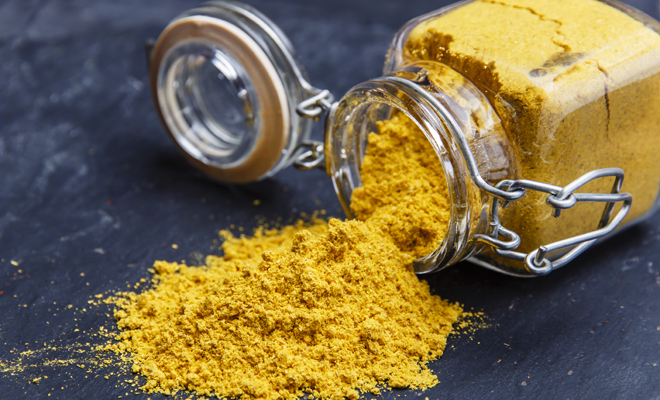Curry is a condiment of Indian origin composed of a wide variety of spices such as cinnamon, coriander, ginger, black pepper, cardamom, nutmeg and turmeric, among others. It is a very aromatic yellow ingredient that has a very strong and slightly spicy flavor. In addition, it is cheap and very easy to obtain.
Giving flavor to your meals with a condiment as rich as curry is something doubly gratifying: On the one hand, you will get a tasty dish and, on the other, your health will be incredibly benefited thanks to its multiple properties. Did you know that curry is the perfect ally for digestion and weight loss? We tell you all the details about this wonderful spice. Very attentive!

Curry helps you lose weight and improves your digestion
Some of the spices present in curry, such as turmeric and black pepper, speed up metabolism, allowing the body to burn more fat. In addition, as it is a spicy condiment, it has thermogenic properties that increase body temperature, inhibit the growth of adipose tissue and, therefore, make you consume more energy. For this reason, curry favors and facilitates the control and reduction of body weight.
Likewise, curry has a satiating and diuretic character, which makes it the perfect ally to combat fluid retention. It also favors the reduction of digestive problems such as bad breath and colic, calms your intestine and blocks any type of food poisoning.
Other benefits of curry for your health
In addition to its great power to improve digestion and lose weight, including curry in your daily diet will provide you with many other very beneficial advantages for your health. Let’s see them one by one!
-
Prevents against Alzheimer’s
According to different investigations carried out by the Jülich Institute of Neuroscience and Medicine (Germany), the effects of turmeric (present in curry) help the recovery and self-repair of different brain functions. In addition, curry prevents the amyloid plaques that cause Alzheimer’s from spreading.
-
Relieves joint pain and inflammation
Curry reduces joint pain, this seasoning being especially recommended for those who suffer from diseases such as rheumatoid arthritis. Its incredible effects have even been compared to the antispasmodic properties of ibuprofen.
-
The perfect anti-wrinkle
Some of the substances in curry contain antioxidant properties which are responsible for protecting our skin against damage from free radicals, thus helping to combat the signs of aging. In fact, a practical way to use this seasoning is through masks which will allow you to hide and even reduce wrinkles generated by age.
-
Strengthens the immune system and prevents colds
If you regularly consume curry by adding it to your dishes, you can fight numerous pathogenic bacteria and make your immune system much stronger. This is very beneficial when it comes to preventing colds and decongesting the respiratory tract.
-
Great for bones
Curry increases bone strength and the speed of bone regeneration and repair. This makes its consumption highly recommended to prevent the appearance of problems or pathologies such as osteoporosis.
-
Prevents cancer
The antioxidant properties of curry are very effective in preventing the appearance and spread of different types of cancer such as breast, prostate or colon, among others.
-
Very good for your heart
Cardamom, another of the spices present in curry, has vasodilator properties that help reduce blood pressure levels. In this way, it also contributes to reducing the incidence of multiple heart diseases.
-
Ways to include curry in your dishes and enjoy its essence
Currently, you can find and purchase curry in any supermarket or food establishment. You can buy both curry powder and paste. Once in your possession, you can give it an infinite number of uses in the culinary field. Take note of what we propose below:
-
Use the curry to make a rich sauce
Curry is an ideal condiment to make a delicious sauce with a very exotic Indian touch. To make a simple curry sauce you will need an onion, a clove of garlic, a pinch of butter, a splash of white wine, cream and, obviously, a tablespoon of curry.
Once you make this sauce, you can use it to accompany meat, rice or vegetable dishes. Yummy!
-
Use curry to enhance the flavor
An even easier way to include curry in your dishes is to simply use it as a spice. In this sense, you can add a little curry to your legume stews such as lentils or chickpeas. However, to get the most out of its flavor you should always add it at the time of cooking and not before. In this way, the curry will be completely diluted in your dish and its ingredients will absorb all its flavor equally.
-
Using the curry in the stew
You can prepare a meat stew with this spice and accompany it with boiled and sautéed white rice to give it an even more oriental touch. When preparing curried meat stews, you should bear in mind that a very effective trick to highlight the flavor of this spice is to season the vegetables that are part of the sauce with a little lemon juice and a generous spoonful of this spice.
-
Make homemade curry
If you want to prepare your own curry at home, you just have to mix a combination of turmeric, a little cayenne pepper, mustard, cardamom, dried coriander, cloves, nutmeg and pepper in a spice grinder. Delicious!
-
Cases in which taking curry is not recommended
Despite being a condiment with multiple benefits, the consumption of curry is not always recommended. Pay special attention to the cases in which this spice should not be taken under any circumstances:
- The consumption of curry is not recommended in cases in which gastritis and gastric ulcers are suffered since its ingredients can increase the risks of irritation.
- Nor should it be ingested in case of kidney stones since turmeric increases the secretion of bile acids.
- It should also be avoided during lactation. Capsaicin, which is present in some seasonings, might alter the taste of breast milk and make it spicy.
